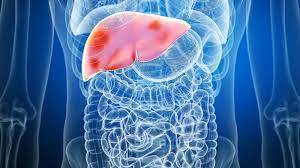
Fatty liver may increase risk of personality disorders by threefold: Study
Link Between Non-Alcoholic Fatty Liver Disease (NAFLD) and Personality Disorders Revealed in New Study
A recent study conducted by scientists at the University of Birmingham in the UK has shed light on a surprising link between Non-Alcoholic Fatty Liver Disease (NAFLD) and personality disorders. The research indicates that individuals with NAFLD are approximately three times more likely to have a personality disorder compared to those without the disease.
NAFLD is a complex global health issue, primarily driven by risk factors like obesity and insulin resistance. In its initial stages, NAFLD may exhibit few noticeable symptoms. However, it can progress to severe conditions like cirrhosis and liver failure, especially in individuals with additional risk factors such as diabetes.
This study calls for a crucial shift in the approach to NAFLD patients. The researchers recommend that individuals diagnosed with NAFLD should also be screened for personality disorders. If such disorders are identified, it is suggested that they be treated before patients embark on dietary and exercise interventions.
Jonathan Catling, co-author of the study, highlights the significance of this discovery, emphasizing that the prevalence of personality disorders is notably higher in NAFLD patients. Importantly, this association does not extend to all liver diseases but appears to be specific to NAFLD.
The study also reveals that while both anxiety and depression are commonly associated with chronic liver diseases, they did not show significant differences between NAFLD patients and those without the disease. This suggests that the link is not related to general mental health issues.
Moreover, the research underscores the challenge of motivating NAFLD patients to adhere to dietary and exercise programs that can prevent the progression of the disease to more severe and irreversible stages. It suggests a need to reevaluate attitudes toward diet and exercise to enhance patient motivation and facilitate more effective treatment strategies, ultimately preventing disease recurrence after liver transplantation.
In conclusion, this study highlights a previously unrecognized connection between NAFLD and personality disorders, emphasizing the need for comprehensive assessments and tailored interventions for individuals dealing with this condition.
What is fatty liver?
Fatty liver, also known as non-alcoholic fatty liver disease (NAFLD), is a condition in which excess fat builds up in the liver. It is a global health problem and multi-faceted disease, with the main risk factors being obesity and insulin resistance.
What are the causes of fatty liver?
The exact cause of fatty liver is not fully understood, but it is thought to be caused by a combination of factors, including:
- Obesity
- Insulin resistance
- High levels of cholesterol and triglycerides in the blood
- Type 2 diabetes
- Certain medications
Symptoms of fatty liver
In the early stages of fatty liver, there may be few or no symptoms. However, as the disease progresses, people may experience symptoms such as:
- Fatigue
- Abdominal pain
- Right upper quadrant pain
- Enlarged liver
- Abnormal liver function tests
Treatment for fatty liver
There is no cure for fatty liver, but the disease can be managed with lifestyle changes, such as:
- Losing weight
- Eating a healthy diet
- Exercising regularly
- Controlling blood sugar levels
If lifestyle changes are not enough, medication may be prescribed to help manage the disease.
Do’s and don’ts for fatty liver
Do’s:
- Eat a healthy diet that is low in saturated and unhealthy fats and high in fruits, vegetables, and whole grains.
- Exercise regularly for at least 30 minutes most days of the week.
- Control your blood sugar levels if you have diabetes.
- Maintain a healthy weight.
Don’ts:
- Drink too much alcohol.
- Smoke cigarettes.
- Take certain medications that can damage the liver.
If you have fatty liver, it is important to work with your doctor to develop a treatment plan that is right for you.

